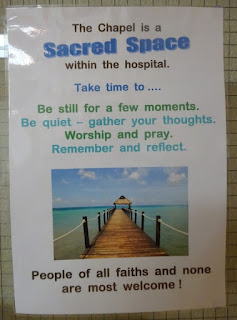It’s one of the functions of faith that it should be there when we need it. Whenever we come across a problem or are confronted by a situation which leaves us wondering how to react, we should be able to call on whatever we believe in - and that doesn’t have to be religious in nature - to help provide a guide for us.
Hospitals are, in some ways, like scaled down versions of the life beyond their walls only with the drama and emotion turned up higher. Life-threatening crises happen on a daily basis here. People come in for help at a time when they and their family or friend are desperate for things to work out well. Even on the brief walk from where I parked I’ve passed people being taken from ward to ward with whom I would not care to change places. I’m aware too that the chapel is only a few joyful, exultant strides from the maternity unit and all the emotion and thanks that brings.
Sometimes all that’s needed is the opportunity to take the briefest of breaks from the pressure. To sit and quietly collect your thoughts and sort out in your own mind what’s happening, what’s likely to happen and how you’re going to feel about that. The chapel - and the little gem of a garden in a courtyard outside - provides that opportunity. Like any church’s clergy or staff, the chaplaincy team here must arrive at work not knowing what they will encounter each day but probably knowing it will be something.
But all the contrasting emotions and needs of the patients whatever they may be, is only half the picture. Because the chapel has to cater for the equally-deserving needs of its marginally more permanent community - the staff. And if the patients are a diverse lot, then so are the staff. That’s why I’m in the chapel this lunchtime with about thirty assorted members of staff to observe Friday prayers.
Through its stained glass entrance way, the chapel is modern and light. There’s plenty of colour in the form of some splendid Christian tapestries and hangings behind a small altar. The simple chairs make it a place which can be quickly reconfigured to meet differing uses.
And it gets a lightning-quick reconfiguring before my eyes now. The chairs are pushed aside to create a central space as a curtain sweeps across to screen off the altar end. Two men swiftly unroll long sheets printed with prayer mat designs and set them out to face east.
Over the next few minutes, as prayers are given individually, the room fills to capacity with a great range of the hospital’s staff. There are some clearly just off the wards still in hospital blue, some from admin, some in the kind of suit only consultants would wear. As the shoes come off so do the lanyards, phones and stethoscopes.
Today’s talk is all about the requirements of praying five times a day and that those prayers must be offered at the correct times and in the correct place to meet that requirement.
As the moment for the collective prayer approaches, the doors continue to open as another and then another nip in to join just in time and I can’t help but wonder about the situations they’ve come from in order to be here. We’re all busy people, I know, but the pressure on some people’s time must be greater than others mustn’t it? Religious observance carries commitment certainly, but when what you’re doing from moment to moment could be life or death to another, that commitment has to expect to be blurred from time to time.
The Friday prayer being solemnly observed, it’s all over and the doors open a final time to let this busy group of people out to rejoin whatever ongoing drama they briefly escaped from. And, with a speed and efficiency any professional theatre would be proud of, the sheets are folded, the curtains re-opened and the chairs painstakingly returned to their neat rows ready for whatever spiritual need this chapel is next required to meet.
Passing through the busy corridor on the way back through the building, I’m acutely aware of the fact that all the people I pass, patient or staff, will have something going on in their minds from which a moment of quiet escape would probably help, and - not for the first time in a hospital - I’m silently thankful that the sign I’m looking for is the one marked EXIT.



